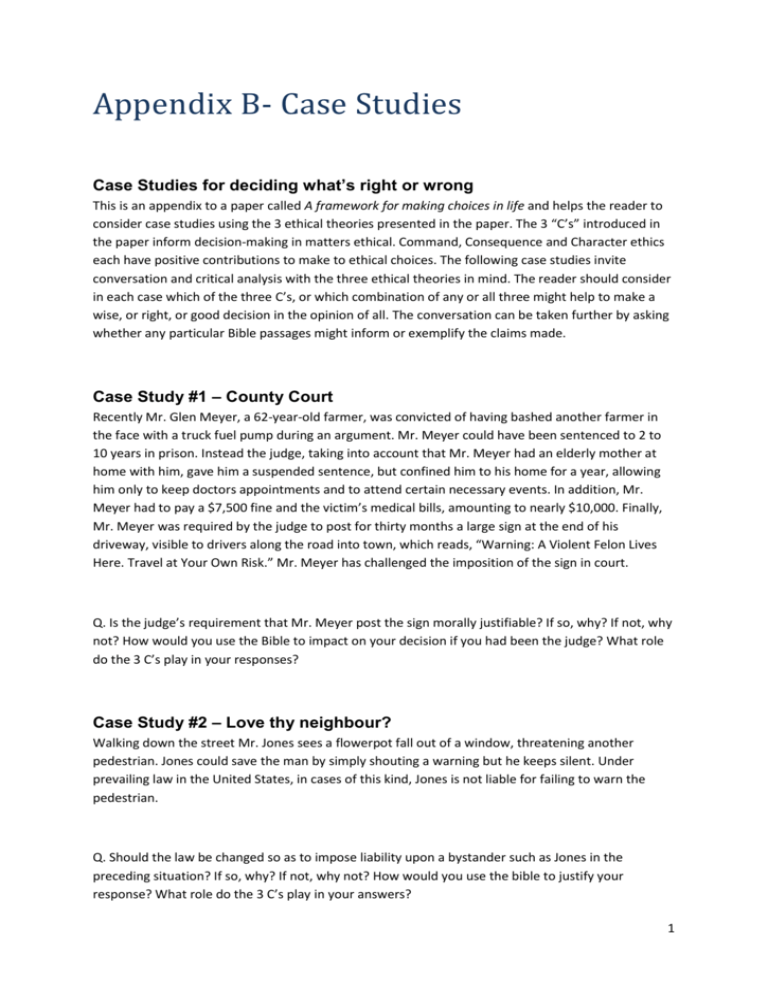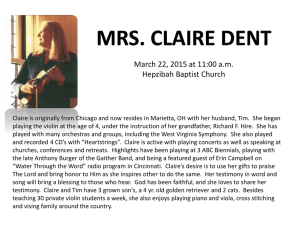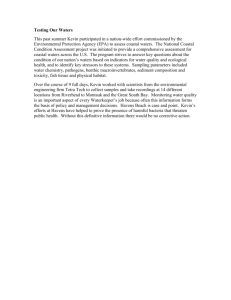A framework for making ethical choices in life.Appendix B
advertisement

Appendix B- Case Studies Case Studies for deciding what’s right or wrong This is an appendix to a paper called A framework for making choices in life and helps the reader to consider case studies using the 3 ethical theories presented in the paper. The 3 “C’s” introduced in the paper inform decision-making in matters ethical. Command, Consequence and Character ethics each have positive contributions to make to ethical choices. The following case studies invite conversation and critical analysis with the three ethical theories in mind. The reader should consider in each case which of the three C’s, or which combination of any or all three might help to make a wise, or right, or good decision in the opinion of all. The conversation can be taken further by asking whether any particular Bible passages might inform or exemplify the claims made. Case Study #1 – County Court Recently Mr. Glen Meyer, a 62-year-old farmer, was convicted of having bashed another farmer in the face with a truck fuel pump during an argument. Mr. Meyer could have been sentenced to 2 to 10 years in prison. Instead the judge, taking into account that Mr. Meyer had an elderly mother at home with him, gave him a suspended sentence, but confined him to his home for a year, allowing him only to keep doctors appointments and to attend certain necessary events. In addition, Mr. Meyer had to pay a $7,500 fine and the victim’s medical bills, amounting to nearly $10,000. Finally, Mr. Meyer was required by the judge to post for thirty months a large sign at the end of his driveway, visible to drivers along the road into town, which reads, “Warning: A Violent Felon Lives Here. Travel at Your Own Risk.” Mr. Meyer has challenged the imposition of the sign in court. Q. Is the judge’s requirement that Mr. Meyer post the sign morally justifiable? If so, why? If not, why not? How would you use the Bible to impact on your decision if you had been the judge? What role do the 3 C’s play in your responses? Case Study #2 – Love thy neighbour? Walking down the street Mr. Jones sees a flowerpot fall out of a window, threatening another pedestrian. Jones could save the man by simply shouting a warning but he keeps silent. Under prevailing law in the United States, in cases of this kind, Jones is not liable for failing to warn the pedestrian. Q. Should the law be changed so as to impose liability upon a bystander such as Jones in the preceding situation? If so, why? If not, why not? How would you use the bible to justify your response? What role do the 3 C’s play in your answers? 1 Case Study #3 – To loan or not to loan Sean and Kevin, two young men in their mid-twenties, have been close friends since they met during their school years. They share numerous similar interests and greatly enjoy each other's company. Kevin gratefully acknowledges to himself that Sean has been a fine friend in every respect that counts. Sean has always been there when Kevin needed encouragement. He has provided assistance unselfishly in large and small matters - e.g. lending Kevin his car when Kevin's broke down, several times helping Kevin move his belongings from one apartment to another, and putting up Kevin's relatives from out of town when Kevin didn't have room for them at this apartment. Kevin has provided similar kinds of support, encouragement, and assistance to Sean over the years. Sean, who has written a number of short stories and poems, has been working on his first novel for the past two years. Kevin is well aware of Sean's first major literary project and fully supports it, in the sense of considering it a highly worthwhile thing for Sean to do. Several weeks ago Sean learned about a small apartment in a quiet area. He believes the flat would provide an ideal working environment for him. Recently Sean has asked Kevin to loan him $1,000 for the bond and the first month’s rent. The request takes Kevin by surprise. Over the years of their friendship neither Kevin nor Sean has asked the other for a loan until now. Monetary affairs have not played a significant role in their relationship as friends, either directly or indirectly. Kevin and Sean both grew up in families where discussion of personal financial issues outside of the family was disapproved of strongly. For this reason, both Kevin and Sean seldom, if ever, discuss their personal finances with each other. Kevin, who works as a project manager for a large engineering firm, can afford to loan the money to Sean. He (Kevin) is not sure, however, exactly how Sean plans to repay the loan on casual wage in retail part-time. Kevin feels acutely uncomfortable raising issues with Sean such as how he plans to repay the loan. Q. What might be a reasonable repayment schedule, and so forth? How would you use the Bible to impact on this matter? What role do the 3 C’s play in your answers? Case Study #4 – Can you keep a secret? Tony, Claire, and Beth were the best of friends through high school. Tony and Beth attended the same uni and began dating each other in their second year. After graduation they announced their engagement and Beth asked Claire to be her bridesmaid. About six months before the wedding, Beth's mother became ill. Since Beth was unemployed, her father asked her if she could stay home and take care of her mother. Because her mother needed her constantly, Beth found little time to spend with Tony. Although Tony became quite lonely, he was very understanding and tried to be as supportive as he could. Two months passed and Beth's mother's condition worsened. Given the circumstance, Claire offered to help Beth to call off the wedding. However Beth explained that the wedding was now even more important to her mother than it was before and that she had no intention of calling it off. Claire understood and continued to be a supportive friend both to Beth and Tony. Knowing Beth's fragile emotional condition and Tony's feelings of loneliness, Claire made a point of spending time with both of them. One evening Claire met Tony for dinner, and noticed while dining that he was very quiet. She asked him if there was something bothering him, other than the obvious circumstance with Beth and her mother. Tony paused for a moment and asked Claire if she 2 could keep a secret. Claire warmly assured Tony that he could tell her anything. He proceeded to confess that he had had a brief affair shortly after Beth's mother became ill. After his confession, Tony told Claire how grateful he was to have gotten all of that off his chest and thanked Claire for being such a good friend. Still, Claire was speechless. The following week, Beth called Claire and asked her to help her pick out a restaurant for the rehearsal dinner. Beth and Claire spent the afternoon driving around visiting restaurants. In the car Beth mentioned that she thought that Tony seemed a little preoccupied for the past month, but also added that the last few times they were together he seemed like his old self again. She then asked Claire for her opinion about whether "something was going on with Tony". Q. What should Claire do? Why? How would you use the Bible to impact on this matter? What role do the 3 C’s play in your answers? Case Study #5 – Playing God Dilemma Most of us know families where all the children are of the same sex, either boys or girls. In at least some of these cases, the parents often wish for at least one more child of the other sex. They desire this, not because they do not like or appreciate the children they already have, but because their hopes and dreams of parenthood often involve having a child of the other sex. A father may dream of teaching a son sports or being the father of the bridge, a mother may look forward to sharing in her daughter’s journey into womanhood or her son’s carrying on of the family name. Until recently, these desires would remain unfulfilled unless they were lucky. Now physicians have available a technique called PGD (Pre-implantation Genetic Diagnosis), which allows physicians to screen embryos for a wide range of possible diseases as well as for gender. Suitable embryos can then be implanted, while the future parents may decide not to implant other embryos. These other embryos, depending on the reasons why they were rejected, may be destroyed or given to other infertile couples, where they will be implanted in the woman and (hopefully) brought to term. Q. What moral considerations should prospective parents consider in regard to their use of PDG? How would you use the Bible to impact on this matter? What role do the 3 C’s play in your answers? Case Study #6 – I do Elmer donated blood that his wife Doris needed during a medical operation. Elmer and Doris were subsequently divorced some time later. Several years after the divorce Elmer, was in an accident and needed a pint of blood. His new wife, Cora, was of a different blood type, and thus could not contribute blood to Elmer. Doris still lived in the same area as Elmer, and there were no healthrelated reasons that would have prevented her from donating blood. 3 Q. Was Doris morally obligated to donate blood to Elmer; “Yes,” “No,” or “It depends”? Whatever your response explain the reasoning behind it. How would you use the Bible to impact on this matter? What role do the 3 C’s play in your answers? 4








